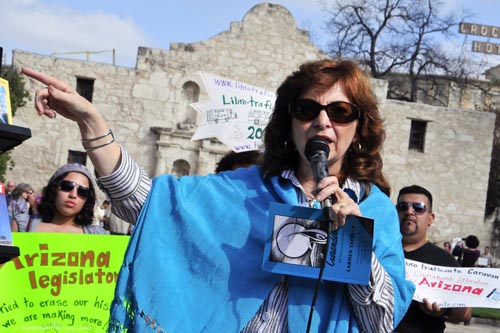Book Smugglers in the United States
by Merritt Wuchina / May 21, 2012 / 9 Comments

Writer Carmen Tafollo (author of Curandera) in front of the Alamo. Behind Carmen, Librotraficantes Jocelyn Viera (on the left) and Lupe Mendez (on the right).
March 17, 2012: Arriving in Tucson
Finally, the group arrived in sunny Tucson in the afternoon on March 16. Billboards plastered with smiling, blond, blue-eyed faces hovered over the city full of Mexican restaurants and “Colonial” artisan shops. In the streets, people of various ethnicities – black, Latino and white milled about dressed in green St. Patrick’s Day garb. At the John Valenzuela Youth Center, the Librotraficantes were welcomed by students and teachers of the Tucson Unified School District for a kickoff press conference.
Book carriers brought over a thousand books into a youth center, establishing the first “underground library” in Tucson. Meanwhile, others handed out books to kids on the street from the window of a low rider. Members of the Association of Raza Educators from Los Angeles, California brought a bit of LA street art to Tucson. They hung up posters, spray-painted with artwork from Gloria Anzaldúa’s Borderlands/La Frontera and Paulo Freire’s Pedagogy of the Oppressed.
- Librotraficante Caravan: Dagoberto Gilb
- Mexican-American writer Dagoberto Gilb reads “Stupid America” by Abelardo Lalo Delgado at the University of Arizona
At a teach-in for one hundred students and one hundred teachers, Bryan Parras led a Theater of the Oppressed workshop, Tony Diaz talked about his Latino literature teaching practices, author Diana López gave a class on how to use the anthology Hecho en Tejas in the classroom, and banned writers like Dagoberto Gilb shared their stories. At the end of the session, each teacher in attendance received a copy of Carmen Tafolla’s Curandera.
The Caravan held its last Literary Showcase, or as Diaz referred to it, a night of “Mind Altering Prose,” at the University of Arizona.
Lorna Dee Cervantes read one of her poems included in the banned book Infinite Divisions: An Anthology of Chicana Literature, as well as from poets like Orlando Ramirez and Sherman Alexie, whose work was also included in banned anthologies.
Caravan leader Liana Lopez stood up to read “Loose Woman,” a poem by Sandra Cisneros.
Of course, it wouldn’t have been a “mind altering” night without the “lethal dose” Diaz promised Arizona three months prior in his video – a dose of Dagoberto Gilb.
From a green cell phone, which Gilb jokingly called his “iTechAztec,” he read not one of his own poems, but a poem by Abelardo Lalo Delgado called “Stupid America,” which appeared in the banned anthology Cantos Al Sexto Sol. “Stupid America,” Glib read, “remember / that Chicano / flunking math and English / he is the Picasso / of your western states / but he will die / with one thousand / masterpieces / hanging only from his mind.”
United States, the Future: Resist the Censorship
Latino literature in Arizona may be in boxes, but the writers, poets, and activists behind the books are jumping out from behind the pages. Rather than disappear, these voices have become more visible, speaking out in ways and places that they had never considered before.
- Teachers and Students United

- Mexican American Studies teachers Jose Gonzalez, Norma Gonzalez and 5-time banned book author Roberto Rodriguez in front of the John Valenzuela Youth Center which also serves as the Tucson Librotraficante Underground Library.

- Maya Arce, senior in the MAS program this year and Nicholas Dominguez – U.N.I.D.O.S. students suing TUSD at the press conference in the John Valenzuela Youth Center.
According to Diaz, “It is now the duty of our people to unite and struggle on behalf of all Americans to preserve the most essential of American values, Freedom of Speech. We must defy censorship.”
To resist that censorship, Diaz envisions Librotraficante becoming more than just a fight against Tucson, but a national movement to promote Ethnic Studies education. He already has proposed a degree in Librotraficante studies.
“It’s our job as artists to inspire and give tools to our scholars to quantify our history,” Diaz said. He proposes a study of history through “Quantum Demographics,” or a study of multiculturalism with the view that history is made of a series of cultural bridges – like the ones between the Mexican, Chinese, and Irish immigrants in El Paso’s Chinatown – and not just a singular thread of one group’s history.
Since the Caravan, Librotraficante has received support from the Houston Chronicle and in-depth coverage by the Texas Observer. A New York Times columnist also wrote about the Arizona policy censoring questions of race. A documentary about the Tucson Mexican-American Studies program called Precious Knowledge is set to air on PBS’s Independent Lens on May 17. Even The Daily Show has satirized the situation, with an interview with TUSD school board member Michael Hicks.
Meanwhile, as the school copies of Curandera sat collecting dust in Tucson, Carmen Tafolla stood in San Antonio’s city council chambers being named the city’s first Poet Laureate. The decision was made independently from the events in Tucson (Tafolla was among 16 people nominated by San Antonio community members and then selected unanimously by a national committee of poets), but it was uncanny that she was both banned and honored for her work at the same time.
As Poet Laureate, Tafolla wants to use her role to better the future. “I think we can avoid it happening [in San Antonio],” she said. “I think I can also use my voice to reach a national audience. I will be speaking at the American Library Association this June on the issue of banning. I think the Laureate role gives credence to the fact that writers with quality and humane ideas are being banned because they’re Mexican American or part of a Mexican American Studies program.”
“I remember when our first donor gave us $100,” Lopez recounts. “She said, ‘I wasn’t really sure you could pull it off.’ ” After supporting and watching her colleges touch down in six cities, bring together various social and activist groups, read their work, and even write their own poetry for the first time, Lopez has seen great personal development. “It’s made people a lot more confident in their work that they haven’t been too sure of before.”
With a new academic degree in the works, national media attention, and thousands of books in underground libraries across the Southwest, it’s hard to believe that the Librotraficantes’ fight against censorship started as nothing more than an inside joke between friends moving boxes after a book fair.





9 Comments on "Book Smugglers in the United States"
Great article! I love to see artists struggling for social justice. But I think it’s a mistake to couch this simply in the terms of censorship and freedom of speech. The Arizona government destroyed this Mexican-American studies programme because they felt the programme was potentially insurrectionarry. It taught people things they shouldn’t know, and it helped an oppressed race rise up. This threatens the US power structure.
This is not an issue of artists saying whatever they wish in the geography of liberal-ideological social discourse. We ought to acknowledge that capitalism and its brothers racism and sexism practice a form of social censorship before one can even graduate high school, let alone become a published (marketable) writer.
To speak solely in terms of censorship versus freedom of speech (a negative freedom) is to elide the greater issue, that of positive freedom. The freedom TO DO something. Most chicanos, most blacks, and so many women of any colour do not have the freedom to publish their works. Here is a socially imposed silence, not from the government, but from the entire system of the United States; everyone imposes this silence. It is a violent silence, a painful silence. These freedom fighters in SW America are fighting to break this silence, so let’s not contribute to the censorship by eliding the larger social issues at play.
Peace and thanks,
Liam Swanson
Liam, I totaly agree with you, this silance must be broken. To blame is the entire system of the United States. So very sad, it has gone on much to long. Many thanks to the young Mexican- American studies students from Arizona that decided to stand up for their Rights for all our Rights.
Thanks for doing this story! I’ve started an online banned bookstore http://buildingabetterworld.wordpress.com/2012/05/24/love-literature-stop-censorship-buy-a-book-build-a-better-world/, specifically encouraging people to:
1. Buy a banned book.
2. Read it.
3. Discuss it with friends and neighbors.
4. Donate it to a librotraficantes library.
So, please, visit the blog and banned bookstore, buy a book, read the book, discuss it, and ship it to a community library (addresses of librotraficante community libraries included).
Thanks for this great article. I am compiling a list of banned books from your list and other lists and going to make sure my library buys these books and has them in a separate and prominent shelf.
My brother suggested I might like this web site.
He was entirely right. This post truly made my day. You can not imagine simply how much time I had spent for this information! Thanks!
Here is my weblog: לחץ כדי לחקור
It’s going to be end of mine day, except before ending
I am reading this enormous piece of writing to increase my
experience.
Trackbacks for this post